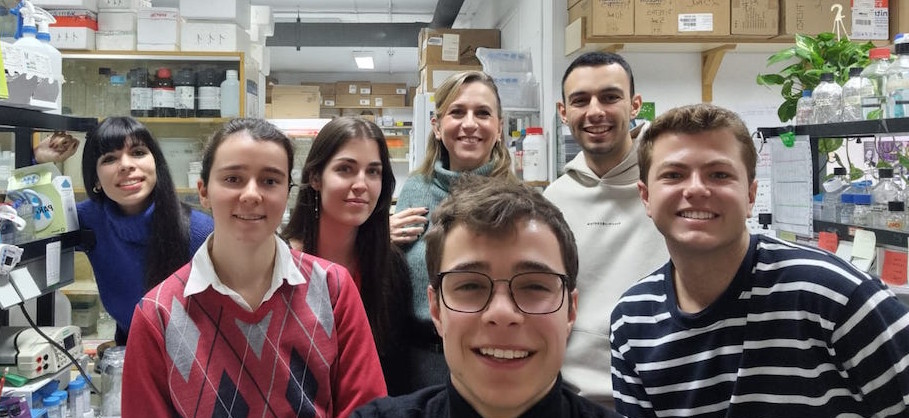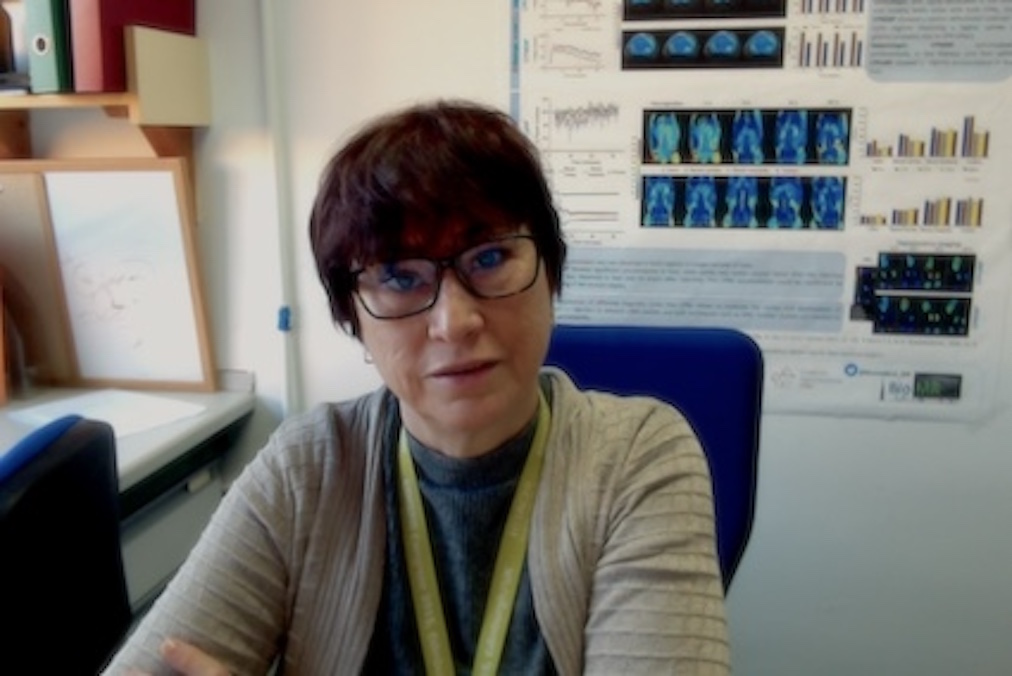In recent weeks, numerous researchers at the Instituto de Investigaciones Biomédicas Sols-Morreale (IIBM), CSIC-UAM have received numerous projects, contracts, grants and other aid from various funding sources.
Research Consolidation 2023
Drs. Cristina Peña Maroto, Alberto Bartolomé, José Luis Orgaz and Miguel Sánchez (in the cover photo) have received Consolidation Research 2023 projects. These projects are part of the State Plan for Scientific and Technical Research and Innovation 2021-2023 and within the State Program to Develop, Attract and Retain Talent. The objective of these grants is to promote the consolidation of the professional career of senior researchers within the Spanish Science, Technology and Innovation System, facilitating the initiation or consolidation of a line of research through the financing of their own project. Several of the recent recipients of these prestigious grants have joined our center a few weeks ago, such as Dr. Peña Maroto, and others have been at the IIBM for more than two years, such as Dr. Bartolomé and Dr. Orgaz.
Knowledge Generation Projects 2022
The following researchers have obtained grants in this call: Drs. Alberto Muñoz and Mª Jesús Larriba, Gema Moreno, Wolfgang Link, Juan Manuel Zapata, Carmen Valenzuela, Jesús Pacheco, Isabel Lastres, Antonio Castrillo, Antonio Cuadrado and Ana Isabel Rojo, Margarita Díaz-Guerra and Víctor Ruiz. Most of these researchers have obtained predoctoral research personnel training contracts (the desired FPI) associated with their projects.
These grants, commonly referred to as "national plan grants", are intended to finance research projects aimed at promoting the advancement of scientific knowledge and research of proven quality, highlighting the commitment to advance towards the search for solutions to society's challenges, a point emphasized considerably by the CSIC.
Dr. Luis Álvarez Grant 2023
Dr. Isabel Lastres Becker's group has received one of the three Dr. Luis Álvarez IdiPAZ grants in modality 1 for emerging and associated clinical groups, to investigate the validation of the cannabinoid CB2 receptor as a possible biomarker in TAU-dependent dementias. The relevance of this grant is the possibility of carrying out a translational project, involving patients. Dr. Lastres, among many other objectives, will analyze extracellular vesicles that will be obtained from patient tissues to integrate this knowledge in her research, with the collaboration of specialists from the Neurology area of the Hospital Universitario La Paz

CSIC Special Intramural Project
Dr. Pilar López Larrubia is the principal investigator of a Special Intramural Project (PIE) of the CSIC, which aims to create a network of CSIC groups working on rare diseases (ER). This grant, entitled: Rare Diseases Network CSIC (RER-CSIC), has a great relevance for the IIBM because from the Center (and with the help of the research groups of the Department of Rare Diseases), will lead and coordinate the rest of the CSIC groups working on RE. The ultimate goal will be to position the CSIC at the forefront of research in these pathologies to persevere in the commitment to translate all the work carried out to society, especially to patients and their families, and contribute to improve their health and quality of life.

Biomedical Research Programs of the Community of Madrid
IIBM researchers, Drs. Juan Manuel Zapata and Manuel Izquierdo among others, have obtained funding from Next Generation CART MAD. This is a multidisciplinary consortium that includes researchers from CSIC, UAM and several hospitals in Madrid, with the aim of developing new therapies based on CAR-T, STAb-T, combined therapies, as well as CAR-T and CAR-NK based on interleukins. The ultimate goal will be to improve the treatment of children affected by pediatric tumors and to eradicate this terrible disease. Dr. Ignacio Palmero is also part of a consortium of researchers funded by this Program. The name of the consortium is SenesceX-CM and includes laboratories from other CAM institutions whose objective is to investigate the process of cellular senescence, a key factor in numerous diseases. This team of researchers aims to elucidate the role of senescence in processes as disparate as embryonic development, aging and cancer as well as to provide therapeutic strategies to combat diseases resulting from inefficient senescence.
Science4Policy
Science for Public Policy is a CSIC program aimed at the preparation of reports prepared by CSIC research teams in order to serve as a bridge between research centers and politicians, and thus contribute to the definition of public policies based on scientific evidence. Drs. María Monsalve and Ángela Martínez-Valverde have obtained a grant in collaboration with Dr. Germán Perdomo with the title: "Metabolic diseases: the epidemics of the 21st century". They will study the clinical and scientific relevance of metabolic diseases in our country and propose socio-political actions.
Several researchers have been obtained grants and contracts for new incorporations in IIBM laboratories. Some examples are the following: Dr. Natalia Sanz Gómez has been awarded a postdoctoral fellowship AECC 2023. This milestone is remarkable considering that the Spanish Agency against Cancer has only awarded 11 grants for the national territory, one of which has been assigned to the IIBM. Dr. Sanz-Gómez will study squamous head and neck cancer (HNSCC) in the research group of Dr. Guillermo de Cárcer. Dr. Virginia Solar from Dr. Lastres' laboratory has been awarded a Juan de la Cierva contract (a grant that is also part of the State Program to Develop, Attract and Retain Talent). Dr. Diaz-Guerra's group has been awarded a predoctoral university staff training contract (FPU).
The IIBM congratulates all these researchers, as well as all the members of the IIBM, for the effort, enthusiasm and passion they devote to their work. Congratulations to all of them!